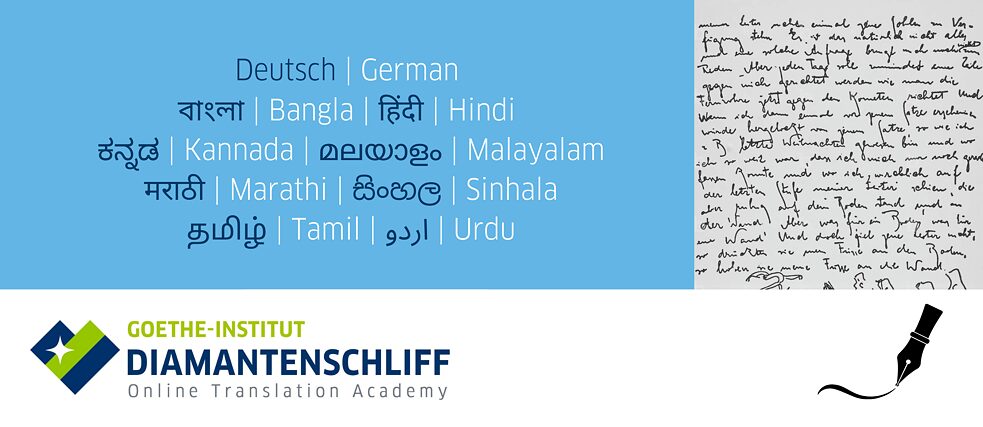Translating Franz Kafka
Guest Contributions
Translations into Persian (Farsi)
The Iranian translator lives at present in Berlin and has little access to his notebooks and written work that he had to leave behind in his home country. The ten texts published here have been sourced as image files from his published works in Iran, namely "Icarus: An Anthology" (Doustan Publishers,Tehran, 2016, 2nd edition 2023) and "43 Stories of Love and Other Things" (Nashre Markaz publishers, Tehran, 2000, 12th edition 2023).
I ordered my horse to be brought form the stables. The servant did not understand my orders. So I went to the stables myself, saddled my horse, and mounted. In the distance I heard the sound of a trumpet, and I asked the servant what it meant. He knew nothing and had heard nothing. At the gate he stopped and asked: “Where is the master going?” “I don’t know,” I said, “just out of here, just out of here. Out of here, nothing else, it’s the only way I can reach my goal.” “So you know your goal?” he asked. “Yes,” I replied, “I’ve just told you. Out of here - that’s my goal.”
(English translation fragment by Tania and James Stern)
Azimat (Farsi)
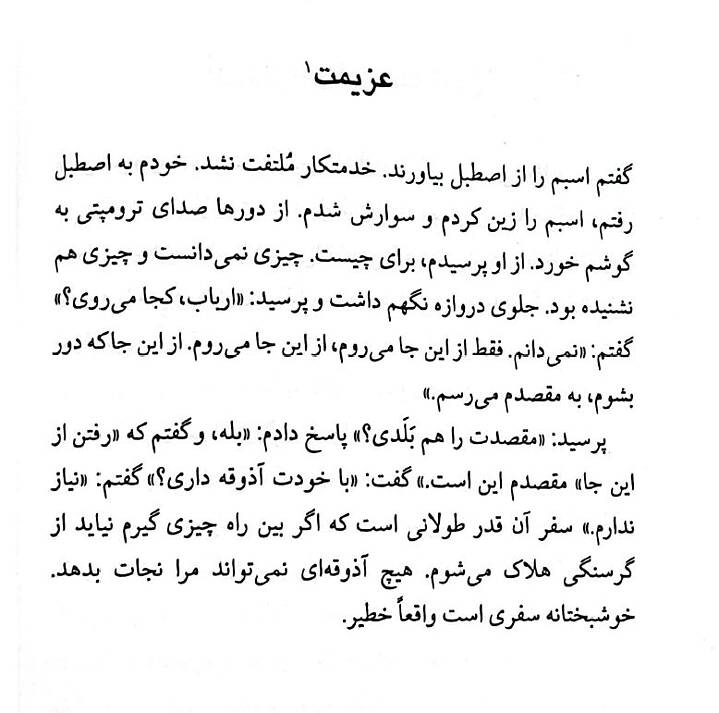
I was stiff and cold, I was a bridge, I lay over a ravine. My toes on one side, my fingers clutching the other, I had clamped myself fast into the crumbling clay. The tails of my coat fluttered at my sides. Far below brawled the icy trout stream. No tourist strayed to this impassable height, the bridge was not yet traced on any map. So I lay and waited; I could only wait. Without falling, no bridge, once spanned, can cease to be a bridge.
It was toward evening one day - was it the first, was it the thousandth? I cannot tell - my thoughts were always in confusion and perpetually moving in a circle. It was toward evening in summer, the roar of the stream had grown deeper, when I heard the sound of a human step! To me, to me. Straighten yourself, bridge, make ready, railless beams, to hold up the passenger entrusted to you. If his steps are uncertain, steady them unobtrusively, but if he stumbles show what you are made of and like a mountain god hurl him across to land.
He came, he tapped me with the iron point of his stick, then he lifted my coattails with it and put them in order upon me. He plunged the point of his stick into my bushy hair and let it lie there for a long time, forgetting me no doubt while he wildly gazed around him. But then -- I was just following him in thought over mountain and valley - he jumped with both feet on the middle of my body. I shuddered with wild pain, not knowing what was happening. Who was it? A child? A dream? A wayfarer? A suicide? A tempter? A destroyer? And I turned around so as to see him. A bridge to turn around! I had not yet turned quite around when I already began to fall, I fell and in a moment I was torn and transpierced by the sharp rocks which had always gazed up at me so peacefully from the rushing water.
(English translation by Willa and Edwin Muir)
Pol (in Farsi)
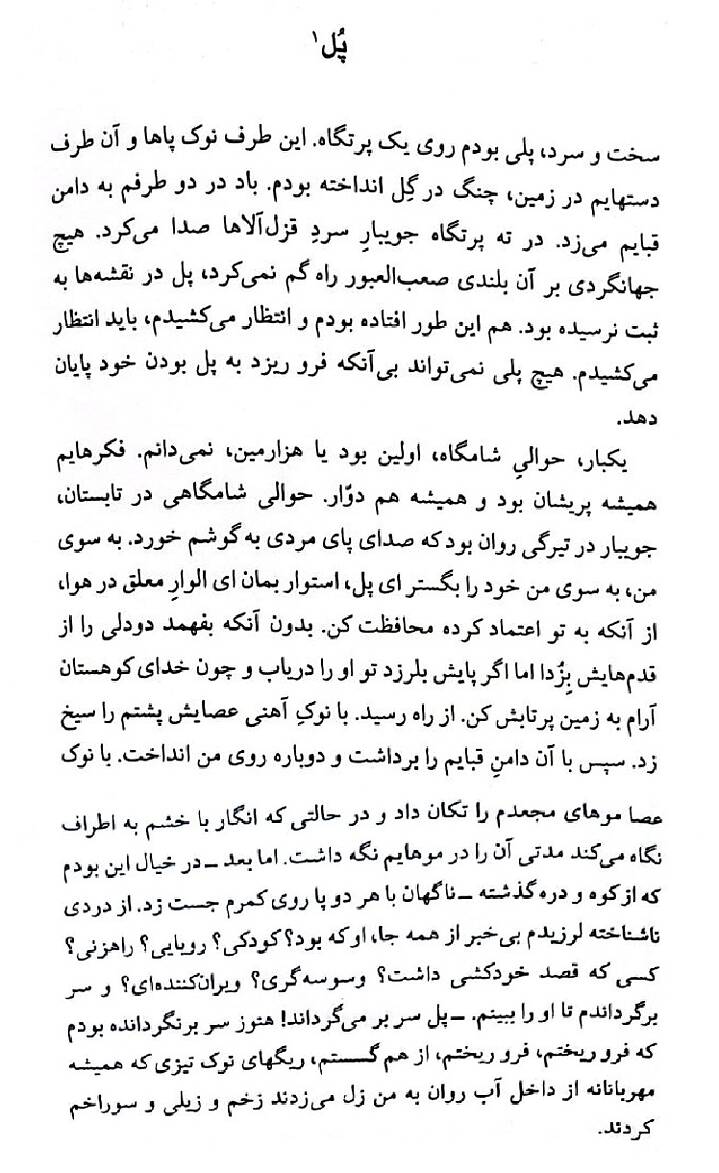
A vulture was hacking at my feet. It had already torn my boots and stockings to shreds, now it was hacking at the feet themselves. Again and again it struck at them, then circled several times restlessly around me, then returned to continue its work. A gentleman passed by, looked on for a while, then asked me why I suffered the vulture. "I'm helpless," I said. "When it came and began to attack me, I of course tried to drive it away, even to strangle it, but these animals are very strong, it was about to spring at my face, but I preferred to sacrifice my feet. Now they are almost torn to bits." "Fancy letting yourself be tortured like this!" said the gentleman. "One shot and that's the end of the vulture." "Really?" I said. "And would you do that?" "With pleasure," said the gentleman, "I've only got to go home and get my gun. Could you wait another halfhour?" "I'm not sure about that," said I, and stood for a moment rigid with pain. Then I said: "Do try it in any case, please." "Very well," said the gentleman, "I'll be as quick as I can." During this conversation the vulture had been calmly listening, letting its eye rove between me and the gentleman. Now I realized that it had understood everything; it took wing, leaned far back to gain impetus, and then, like a javelin thrower, thrust its beak through my mouth, deep into me. Falling back, I was relieved to feel him drowning irretrievably in my blood, which was filling every depth, flooding every shore.
(English translation by Tania and James Stern)
Laashkhor (Farsi)
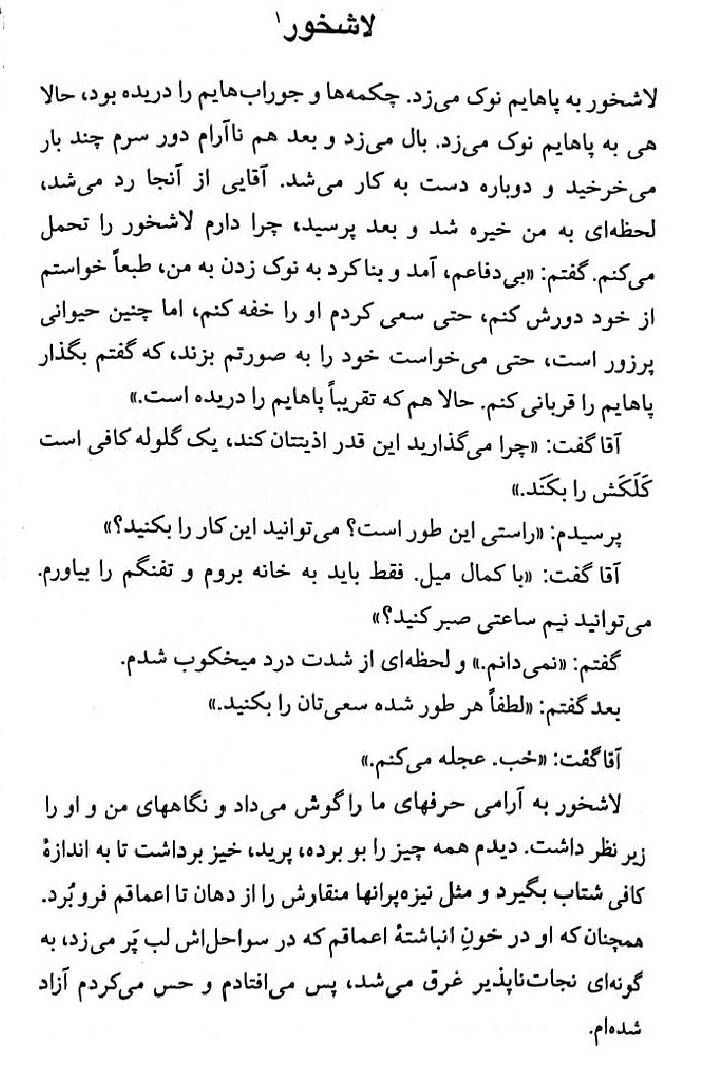
I sit in my room, the headquarter of noise of the entire apartment. All the doors I hear slamming, and by such noise I am spared only the continuous footsteps between them – still I hear the stove's door shutting in the kitchen. Our father barges through the doors of my room and crosses through and his nightgown trails behind him; the ashes are being scraped from the oven in the next room; Valli, bellowing word by word through the hall, asks if father’s hat has been cleaned already. A hiss, that wants to befriend me, still carries the scream of a responding voice. The house door is unlatched and blows open, like a catarrhal throat that opens wider with the singing of a female voice and finally closes itself with a dull, manly and most ruthless jolt. Father has gone; now begins the delicate, scattered, helpless noise led by the voices of two canaries. I had thought of that earlier, and now with the canaries it occurs to me again, whether I should open the door a crack and, like a snake, slither into the next room and beg my sisters and their governess on the ground floor for some quiet.
(English translation courtesy literaryjoint.blogspot.com)
Sarosedaye Mahib (Farsi)
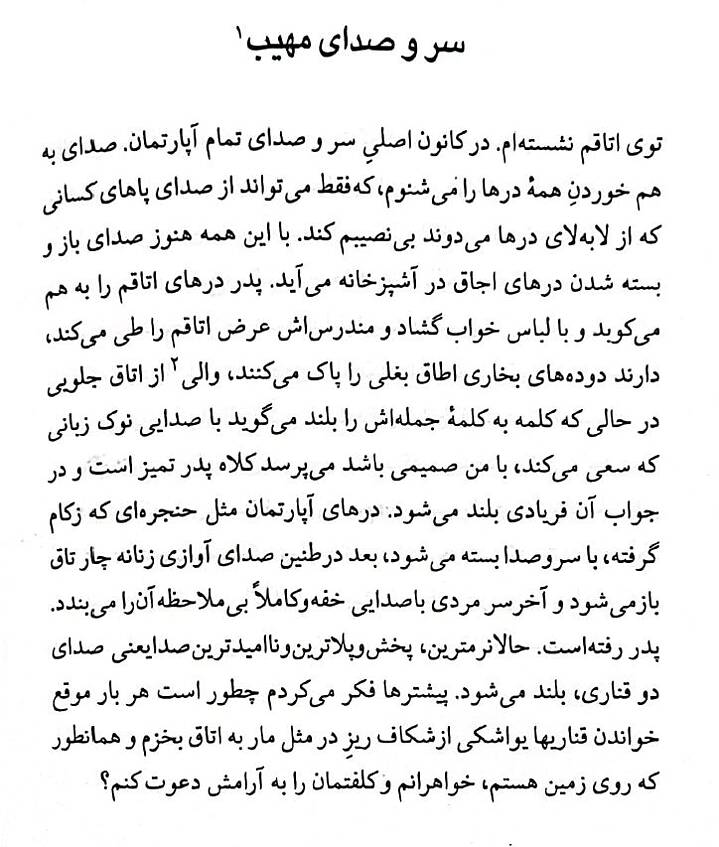
"ALAS," said the mouse, "the world is growing smaller every day. At the beginning it was so big that I was afraid, I kept running and running, and I was glad when at last I saw walls far away to the right and left, but these long walls have narrowed so quickly that I am in the last chamber already, and there in the corner stands the trap that I must run into." "You only need to change your direction," said the cat, and ate it up.
(English translation by Willa and Edwin Muir)
Afssanak (Farsi)
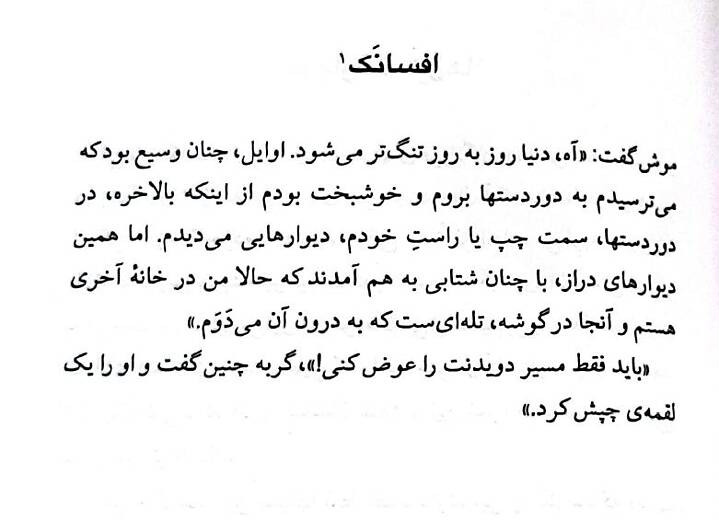
A man doubted that the emperor was descended from the gods; he asserted that the emperor was our rightful sovereign, he did not doubt the emperor's divine mission (that was evident to him), it was only the divine descent that he doubted. This, naturally, did not cause much of a stir; when the surf flings a drop of water on to the land, that does not interfere with the eternal rolling of the sea, on the contrary, it is caused by it.
(English translation: unknown source)
Empratour (Farsi)
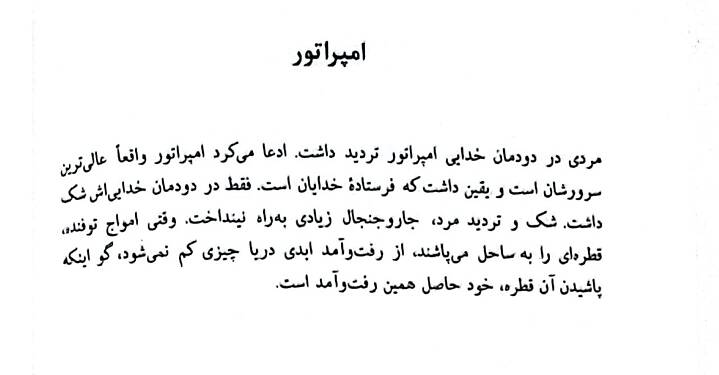
They were given the choice of becoming kings or the kings’ messengers. As is the way with children, they all wanted to be messengers. That is why there are only messengers, racing through the world and, since there are no kings, calling out to each other the messages that have now become meaningless. They would gladly put an end to their miserable life, but they do not dare to do so because of their oath of loyalty.
(English translation by Ernst Kaiser and Eithne Wilkins)
Paykha (Farsi)
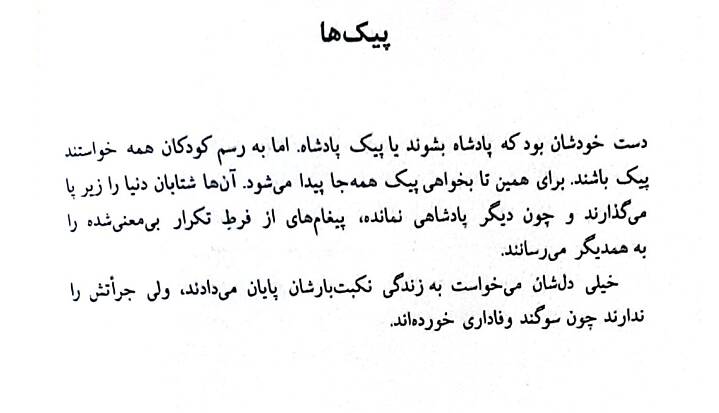
November 30, 1917:
The Messiah will come as soon as the most unbridled individualism of faith becomes possible - when there is no one to destroy this possibility and no one to suffer its destruction; hence the graves will open themselves. This, perhaps, is Christian doctrine too, applying as much to the actual presentation of the example to be emulated, which is an individualistic example, as to the symbolic presentation of the resurrection of the Mediator in the single individual.
December 4, 1917:
The Messiah will come only when he is no longer necessary; he will come only on the day after his arrival; he will come, not on the last day, but on the very last.
(English translation courtesy zork.net)
Amadane Massih (Farsi)
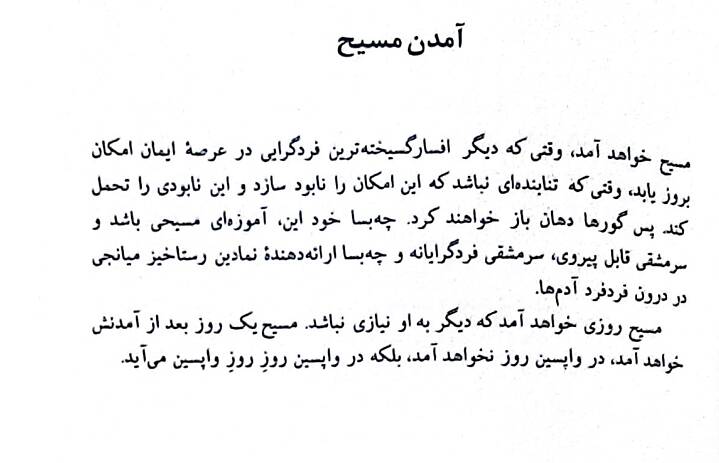
Deeply lost in the night. Just as one sometimes lowers one's head to reflect, thus to be utterly lost in the night. All around people are asleep. It's just play acting, an innocent self-deception, that they sleep in houses, in safe beds, under a safe roof, stretched out or curled up on mattresses, in sheets, under blankets; in reality they have flocked together as they had once upon a time and again later in a deserted region, a camp in the open, a countless number of men, an army, a people, under a cold sky on cold earth, collapsed where once they had stood, forehead pressed on the arm, face to the ground, breathing quietly. And you are watching, are one of the watchmen, you find the next one by brandishing a burning stick from the brushwood pile beside you. Why are you watching? Someone must watch, it is said. Someone must be there.
(English translation by Tania and James Stern)
Shabhaa (Farsi)
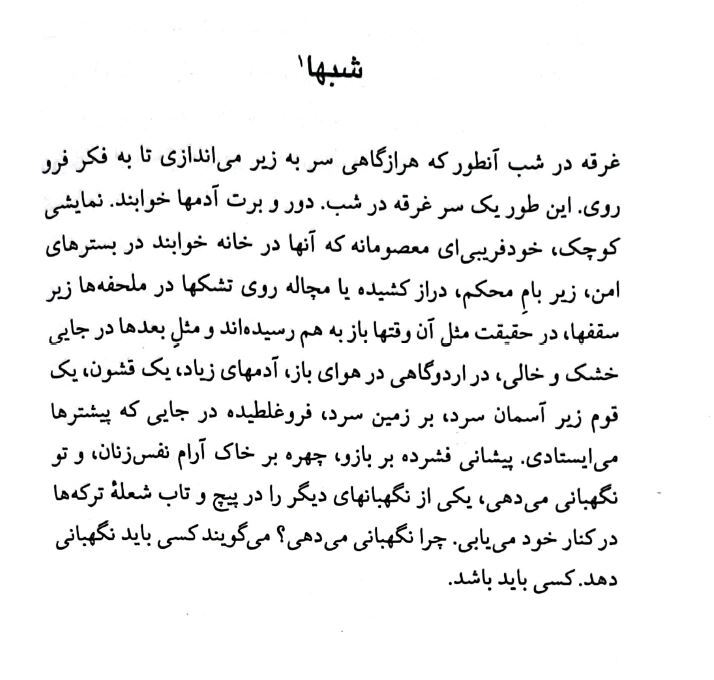
Many complain that the words of the wise are always merely parables and of no use in daily life, which is the only life we have. When the sage says: "Go over," he does not mean that we should cross to some actual place, which we could do anyhow if the labor were worth it; he means some fabulous yonder, something unknown to us, something that he cannot designate more precisely either, and therefore cannot help us here in the very least. All these parables really set out to say merely that the incomprehensible is incomprehensible, and we know that already. But the cares we have to struggle with every day: that is a different matter.
Concerning this a man once said: Why such reluctance? If you only followed the parables you yourselves would become parables and with that rid of all your daily cares.
Another said: I bet that is also a parable.
The first said: You have won.
The second said: But unfortunately only in parable.
The first said: No, in reality: in parable you have lost.
(English translation by Willa and Edwin Muir)
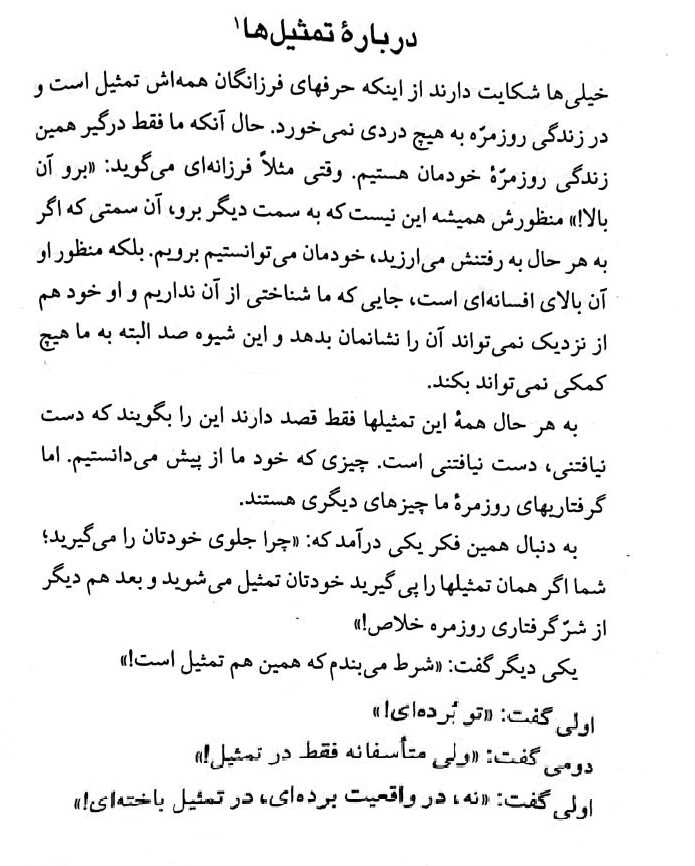
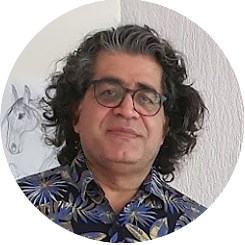 © Ali Abdollahi
Ali Abdollahi, born in 1968 in Birjand, Iran, is a poet and translator from German into Persian. He studied German language and literature at the University of Tehran. In his home country he has published seven volumes of poetry as well as various anthologies of modern German-language poetry and prose - including works by Nietzsche, Heidegger, Rilke and Kafka. Currently he lives in Berlin and works as a freelance writer and translator in exile. He writes in Persian and sometimes in German.
© Ali Abdollahi
Ali Abdollahi, born in 1968 in Birjand, Iran, is a poet and translator from German into Persian. He studied German language and literature at the University of Tehran. In his home country he has published seven volumes of poetry as well as various anthologies of modern German-language poetry and prose - including works by Nietzsche, Heidegger, Rilke and Kafka. Currently he lives in Berlin and works as a freelance writer and translator in exile. He writes in Persian and sometimes in German.Since August 2019, five books by Abdollahi have been published in Germany, including the poetry collection "Wetterumschlag" (Weather Change, Secession Verlag Berlin, 2021), "Das Persische Europa" (The Persian Europe, ed. with Daniela Danz (Wunderhorn Verlag, 2021) and "Ein Dieb im Dunklen starrt auf ein Gemälde" (A Thief stares at a Painting in the Dark), Persian-language poetry of the 21st century (Sujet Verlag Bremen, 2021, 2nd edition 2023, with Kurt Scharf).
Since 2005 Abdollahi has been the Iranian partner of lyrikline.org at the "Haus für Poesie".
